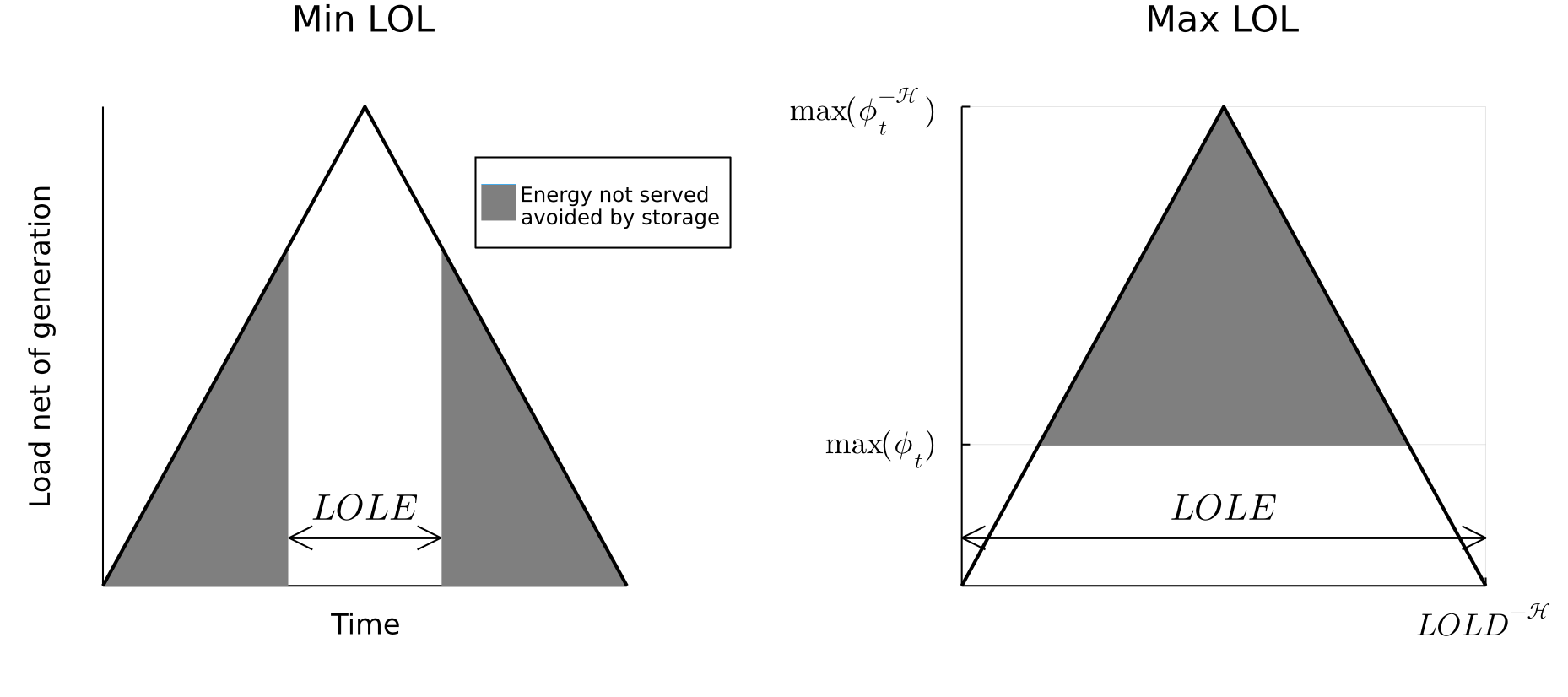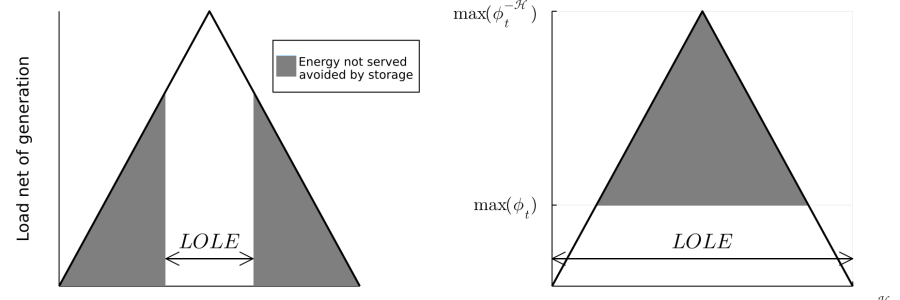Yesterday I had my weekly meeting with my master thesis student and it was bloody good fun. Regular readers of this blog (if there is such a thing) will know that this is quite the novelty. I'm generally quite disinterested and disillusioned with my PhD, and indeed this was fun in the same way that learning to solve a Rubik's cube is fun, with the exception that research tends to be more creative and open ended. In any case, it sparked a number of thoughts on complexity that I thought worth regurgitating here.
First though, allow me to give you a sneak preview of the figure that's inspired about half of my PhD (which for some stupid reason also appears at the top of the page and honestly I'm not bothered to fight Grav about this).

This figure represents a single scarcity event in a power system, i.e. a moment where the demand for electricity is greater than the total possibly supply from generators (wind turbines, gas power plants, solar PV, nuclear, ...). Without further intervention, someone e.g. the Transmission System Operator (TSO) which in Belgium is Elia, would have to employ "load shedding" or "load curtailment", which is a euphemism for cutting consumers off from the grid to avoid everything going to shit. Luckily, there's some stored electrical energy (e.g. from grid scale batteries ) that we can use to alleviate the situation.
The key point I've been banging on about for the last 2 years is that you can choose how to distribute this energy, and this affects a commonly used indicator of the "adequacy" or "reliability" of your power system, the Loss of Load Expectation (LOLE). Aside from this being a bit surprising if you're into this sort of thing, it has a bunch of other explanations. You can read a more complete explanation of this simple model here.
Aside from showing off, I included this figure because it's quite fun to simplify a complex problem like power system adequacy to the point where you can write down analytical expressions and gain insights into your problem just with some basic geometry. My master thesis student is using this simple model to calculate marginal capacity credits (which have their own Wikipedia page, damn) depending on how a resource is operated and it's also helped me clarify a bunch of concepts on the subject (mainly the difference between marginal and average capacity credits).
Honestly I've already bored myself so let's cut to the chase. Simplifying a complex problem like this can say more about you and what you care about than the problem at hand. For example, you know already that I care about well functioning power systems as you might have in the EU, US and South America. In many / most [reference needed] parts of the world access to electricity is an intermittent luxury and power outages are an accepted part of life. Short term electricity storage from e.g. batteries is also a far fetched dream for them. You can also know that I don't particularly care about who gets their power cut during scarcity because I haven't made an explicit attempt to model consumers people and their consumption of electricity (though I could smooth talk my way out of that one).
Thinking about the power system in this abstract way is not necessarily typical in my field I should say. There's plenty of research where detailed models of electricity or energy consumption e.g. from heating with heat pumps is coupled with a more abstract power system model to investigate "the effects of heating flexibility on power system investments", which inevitably turns out to be A Good Thing. There's also research about actually making that happen, which invariably involves cramming every household with a smart meter because, well, otherwise you can't really do much.
The mark of a good researcher (in this field and others as well I presume) is therefore to show that while you're focussing on a particular aspect of a subject, you're aware of how the solutions to the problem you're tackling would manifest themselves elsewhere [insert example if bothered]. In other words you're trying to avoid reductionism, that is simplifying a problem to the point that it's completely dissociated from the real world.
My issue is that in STEM subjects your models nearly always have to be quantitative. If you can't put a number to something then, well, bugger off, no one will listen to you. In my review of Minna Salami's book I quoted her saying something similar about our modern society only valuing technical knowledge. I don't know how much of a role this plays in the whole affair, but quantitative models are also, as I mentioned at the start of this post, bloody good fun to manipulate (choice of "manipulate" instead of "play around with" is deliberate).
Concretely this means that people are very crudely represented e.g. as utility maximising individuals so that you can at least in some way influence their energy consumption in your model (I've started mixing up electricity and energy, apologies). You can do this in rather fancy ways too, accounting for the "bounded rationality" of consumers people using prospect theory for example.
I'm more and more convinced that reducing the infinitely rich aspects of a person by trying to model them is problematic however. I would grudgingly accept that you could do this "d'une manière bienveillante" (can't be arsed to translate that) but more often than not it's used as an implicit way of controlling people. After all, if you know how people will react to something then you can take action that will result in the outcome that you desired. A very crude example: if you know how someone will react to their electricity bill(s), then you can design policies and regulations to get them to consume when you want them to to avoid coincident peaks and therefore grid investments (I actually have a reference for this one).
I imagine that most of my colleagues would read the above and think "That doesn't sound too bad at all. Heck, that's what policy recommendations are for!" I suspect that I'm digressing violently from any point I hoped to make at the outset of this article, but this is a very paternalistic and condescending way of treating consumers people. You don't consult them, ask them what they would want, explain them the problem you're trying to solve, devise solutions together. You just assume they couldn't give half a toss or couldn't understand even if they tried.
Which is probably quite true. I do not understand my colleague's work on distribution grid tariff's yet it affects everyone in Belgium. In fact, it's a whole thing in Flanders. I can also completely understand that you could desperately search for days for fucks to give about such a topic and still return empty-handed. Which brings me to my final point about oppression, hence justifying my vaguely punny title.
I did an arpentage not so long ago on a book written by anarchists regarding sabotage. In the section I read, they discussed how written language can be a form of oppression, since you need to be able to read to understand laws and not break them. You also need to be able to read the language a contract is written in to figure out that you've just agreed to give the land you live on plus your children as slaves to some silly looking white bloke bastard. In case you're wondering, they mentioned this to explain the phenomenon of book and library burnings, which supposedly were done also to liberate people from debt. After all, you can't owe someone money if they don't have proof of it.
The complexity of the modern world can be seen more generally as a form of oppression. The easiest example to cite is tax codes. These can be insanely complicated and this is largely to the benefit of those who can pay accountants (the poor sods) to evade said taxes. Honestly, every so often I read the last pages of the Private Eye and there always seems to be some complicated new wheeze to steal money, legally or not, with a smorgasbord of repulsive jargon to accompany it.
Coming back to our example of grid tariff design. This is a complex subject which affects millions of Belgians yet very few have the time or willingness to engage with it. I'm sure you can think of countless other, undoubtedly sexier, examples. This is in fact a defining feature of our complex, interconnected, globalised world, where decisions are seldom made by a representative sample of the people who will be affected by them. Add the adjectives racist and sexist to my description of the world and the issue with that becomes clearer. While I'm sure that most of the time complexity is not deliberately instrumentalised for the purposes of bastardism and general dickheadedness, it definitely can be, and in any case you will probably have adverse impacts even with the best of intentions because that's how complex systems work. I'm tempted also to quote Pablo Servigne on the fragility of complex systems, but I've spent too much time procrastinating already.
Brief reflection(s)
I should really write down what I want to say before I start writing. Hopefully this post proves amusing and interesting despite it's chaotic nature.
